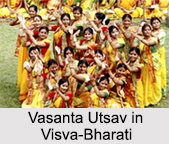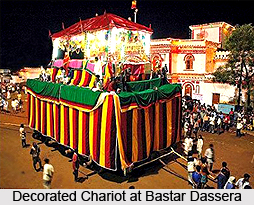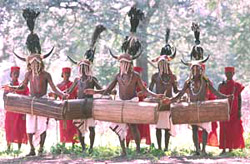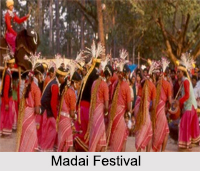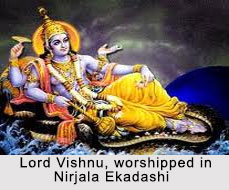 Nirjala Ekadashi is a Hindu holy day falling on the 11th lunar day ("Ekadashi") of the waxing fortnight of the Hindu month of Jyestha (May/June). Deriving its name from the water-less ("Nir-jala") fast observed on this day, Nirjala Ekadashi is considered as the most austere and hence, most sacred of all Ekadashis, if observed religiously, is said to be the most rewarding and granting virtue gained by the observance of all 24 Ekadashis in the year.
Nirjala Ekadashi is a Hindu holy day falling on the 11th lunar day ("Ekadashi") of the waxing fortnight of the Hindu month of Jyestha (May/June). Deriving its name from the water-less ("Nir-jala") fast observed on this day, Nirjala Ekadashi is considered as the most austere and hence, most sacred of all Ekadashis, if observed religiously, is said to be the most rewarding and granting virtue gained by the observance of all 24 Ekadashis in the year.
Legend of Nirjala Ekadashi
Nirjala Ekadashi is also known as Pandava Bhima Ekadashi or Pandava Nirjala Ekadashi, being derived from Bhima, the second and strongest of the five Pandava brothers, heroes of the Hindu epic Mahabharata. The Brahma Vaivarta Purana narrates the story behind the Nirjala Ekadashi "vrata" (devotion and pious observances such as fasting) vow. Bhima, a lover of food, wanted to observe all Ekadashi fasts, but could not control his hunger. He approached the sage Vyasa, author of the Mahabharata and grandfather of the Pandavas for a solution. The sage advised him to observe "Nirjala Ekadashi", when for one day in the year he should observe an absolute fast. Bhima attained the virtue of all 24 Ekadashis by observing Nirjala Ekadashi.
Devotional Practices in Nirjala Ekadashi
While on other Ekadashis abstinence of food is observed, on Nirjala Ekadashi, an absolute fast is observed without partaking even water. The water-less fast is considered extremely difficult to follow as the day falls during the hot Indian summer and thus, also deemed as very pious austerity. The fast is observed 24 hours from sunrise on the day of Nirjala Ekadashi to sunrise the following day, while some observe it from sunrise to sunset on the very day. On the day preceding Nirjala Ekadashi, the devotee performs the evening prayer called the "Sandhyavandanam" and takes only one meal, without rice as rice eating is prohibited. The devotee is however permitted to have a single tiny drop of water as part of the Achamana purification ritual. Consumption of water more than that equals breaking the vow.
Offerings to Lord Vishnu on Nirjala Ekadashi
Like the other Ekadashis, the divine devotion or "puja" is offered to Lord Vishnu, for whom Ekadashis are sacred, to seek his grace. An image of Vishnu or a Saligrama stone (an iconic fossil stone in the form of Vishnu) is bathed (the practice referred to as "abhisheka") with Panchamrita, a mixture of five foods: milk, curd, ghee, honey and sugar. It is then washed with water and dressed in royal finery. Flowers, incense, water, a hand-fan and "aarti" (lamps) are offered. Devotees meditate on the deity"s image. In the evening, they worship Lord Vishnu holding Durva grass in their hands. The devotees remain awake the whole night, singing praises of Vishnu or meditating on his image.
Another characteristic of the Ekadashis is charity to the Brahmins (the priest class). Clothes, food grains, umbrellas, hand-fans, pitchers filled with water, gold etc. are prescribed to be donated to them on the occasion of Nirjala Ekadashi.
Merits of observing Nirjala Ekadashi
According to the Markandeya Purana and the Vishnu Purana, the day of Ekadashi is in itself a manifestation of Lord Vishnu. The "vrata" observed on Ekadashi is said to wash away all sins. One who completes the "vrata" of Nirjala Ekadashi is believed to gain the favour of Vishnu, who grants him happiness, prosperity and forgiveness for sins. The devotee is described to receive the merit gained by observance of all the 24 Ekadashis of the year. It is most popular and strictly observed amongst the Vaishnavas in particular. The observer earns longevity and Moksha (salvation). Usually, the messengers of the God of death Yama are described to fetch the person`s soul after death. Yama then judges the person`s deeds and sends his soul to either Swarga (heaven) or Naraka (hell). However, one who observes the Nirjala Ekadashi rituals is believed to be excused from Yama`s judgment and taken by the messengers of Lord Vishnu to Vaikuntha, His holy abode, after death.
Related Articles:
Hindu Festivals
Indian Religious Festivals
Ekadashi
Brahma Vaivarta Purana
Bhima
Mahabharata
Hindu Vrata
Lord Vishnu
Markandeya Purana
Vishnu Purana

